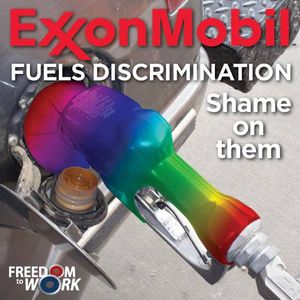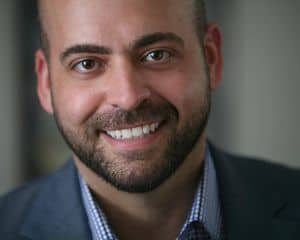Two applicants apply for the same job — Marketing Associate for EnormoCorp. The applicants, Alice and Barbara, are identical in some ways: same college, same gender, even the same hometown. But Alice is consistently superior in the relevant qualifications: Alice has a 3.8 GPA to Barbara's 3.2; Alice has been a Marketing Assistant for 5 years, Barbara for only 2; Alice's skills in Excel and other computer programs, all of which are listed in the job description as necessary for the job, is "excellent," but Barbara can only boast of "proficient" skills.
 Alice's resume also notes that she is the treasurer of her local chapter of the Gay and Lesbian Victory Fund. Barbara does volunteer campaign work for Emily's List, the organization that helps elect women candidates.
Alice's resume also notes that she is the treasurer of her local chapter of the Gay and Lesbian Victory Fund. Barbara does volunteer campaign work for Emily's List, the organization that helps elect women candidates.
If you ran human resources for EnormoCorp, you'd at least want to interview Alice first. She's the more qualified of the two applicants.
ExxonMobil does things a little differently. It discriminates against the LGBT applicant because it can.
In December of last year, the gay rights organization Freedom to Work and its founder, Tico Almeida, wanted to expose incident of Exxon's antigay discrimination. Mr. Almeida tested the company with two ghost applicants just like Alice and Barbara, and Exxon went for Barbara. In fact, Exxon didn't just opt for the non-gay candidate; when she never responded to their several calls to come in for an interview, Exxon never even contacted the gay applicant as a back up! Along with Peter Romer-Friedman, an attorney at Cohen Milstein Sellers and Toll PLLC, Mr. Almeida is suing Exxon for violating Illinois's nondiscrimination laws. And they're going to win.
The most remarkable thing about this case is not that it highlights the need for a federal LGBT nondiscrimination act. Nor is it that this kind of discrimination happens every day. Those facts are, in fact, quite unremarkable. Rather, what's amazing is that even though the technique of sending in "testers" like Alice and Barbara has been outrageously successful in identifying and stopping discrimination against African Americans, Hispanics, the disabled, and other protected groups, this is the first time it has been used to advance the cause of gay rights.
I will be following this case every step of the way, bringing you updates and progress reports, as well as insights into the employment discrimination litigation process.
I start with the basics: how this case came about and why it's so important,
AFTER THE JUMP…
In one sense, this case really started 14 years ago when Exxon bought Mobil and actually erased Mobil's gay nondiscrimination rule. The issue has been simmering and boiling over regularly since then, most recently at Exxon's latest shareholder meeting where LGBT nondiscrimination was again voted down with the active support of the company's directors.
More accurately, this case — captioned, Freedom to Work v. ExxonMobil Corporation — is one in a long line of what civil rights attorneys call "testing cases." African American civil rights organizations have used this technique with considerable success. For example, two couples, one black and one white, go into a leasing office at an apartment building and show financial credentials that clearly make the black couple the better leasee. The building's decision not to rent to the more qualified applicant can be the beginning of a housing discrimination case.
That Mr. Almeida's version of Alice and Barbara didn't ever exist except on paper doesn't matter.
"The way this plays out in reality is no different than how it would play out in this test," Mr. Romer-Friedman said. The beauty of the test is that it gets us as close as possible to a lab experiment setting, Mr. Romer-Friedman notes. "It shines a light on what's actually happening to demonstrate that what you have is sexual orientation-based discrimination."
In other words, testing attempts to control for all other possible factors by making the choice as stark as possible: either choose the better qualified minority or choose the less qualified majority.
Testing, therefore, is an essential piece in any civil rights litigation puzzle.
First, testing is necessary to find concrete examples of discrimination. Mr. Romer-Friedman, an experienced employment lawyer, knows that it's notoriously difficult to document and uncover discrimination in the hiring process, so we need these kinds of experiments to quiet all the noise, focus on blatant discrimination, and bring actual cases to light.
Second, the mere fact that testing exists as a legitimate law enforcement strategy has the positive effect of reducing discrimination. "The fact that employers know that they may be subjected to testing puts them on notice not to discriminate or they may face legal action," Mr. Romer-Friedman said.
And, third, testing not only worked well in the past, but the Supreme Court has recognized it as a legitimate and necessary technique.
 To my knowledge, Mr. Almeida (pictured) of Freedom to Work is the first attorney to use testing to advance the cause of gay rights. We know Mr. Almeida from his efforts to get Congress to pass the Employment Non-Discrimination Act (ENDA) and to push President Obama to side step Republican obstructionism by issuing an ENDA executive order, which would apply to federal contractors like Exxon. In the past year, he has shifted a portion of his organization's resources to investigate and combat discrimination on the basis of sexual orientation and gender identity. "Freedom to Work is launching a testing project, the only one of its kind in the country, in which we are testing numerous companies in numerous states," he said.
To my knowledge, Mr. Almeida (pictured) of Freedom to Work is the first attorney to use testing to advance the cause of gay rights. We know Mr. Almeida from his efforts to get Congress to pass the Employment Non-Discrimination Act (ENDA) and to push President Obama to side step Republican obstructionism by issuing an ENDA executive order, which would apply to federal contractors like Exxon. In the past year, he has shifted a portion of his organization's resources to investigate and combat discrimination on the basis of sexual orientation and gender identity. "Freedom to Work is launching a testing project, the only one of its kind in the country, in which we are testing numerous companies in numerous states," he said.
But the importance of Freedom to Work v. Exxon Mobil goes beyond finding particular incidents of discrimination. It reminds us that every day, hundreds of thousands of LGBT Americans are looking for work in states where being gay can disqualify them from even getting a foot in the door. "Filing this lawsuit has an important educational value," for the American population as a whole and corporate America, said Mr. Romer-Friedman. "We hope that this lawsuit can cause Exxon to come to the table and understand why it's important to have a policy to protect LGBT Americans."
It is also a necessary reminder for those of us in the gay community.
"As ENDA advocates," Mr. Almeida told me, "it's important that we do this. Enthusiasm for ENDA stalls [in our community] when marriage is on the table because there seems to be so many more compelling personal narratives about marriage and gay couples who want to get married."
He's right. How many warm and loving, sometimes heartbreaking, but always inspiring videos do we see about two people who just want to get married? Compare that to how many videos we see about employment discrimination. There's a natural bias against those narratives built into the legal process: employment discrimination cases tend to settle with confidentiality clauses, preventing anyone from reporting on how bad things really are. Freedom to Work is trying to build that narrative one case at a time.
***
Follow me on Twitter: @ariezrawaldman
Ari Ezra Waldman is the Associate Director of the Institute for Information Law and Policy and a professor at New York Law School and is concurrently getting his PhD at Columbia University in New York City. He is a 2002 graduate of Harvard College and a 2005 graduate of Harvard Law School. Ari writes weekly posts on law and various LGBT issues.



